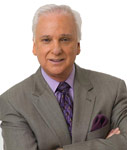
Many years ago, in the late 1960s and into the 1970s, the then president of CBS News met every week with the top brass of the CBS network at Black Rock, the company headquarters in Manhattan. After one of those meetings he returned to his office at the CBS News studios and summoned his top lieutenants.
The way the story goes, he told them, "I have good news and bad news, which do you want to hear first?β One of the journalists said, "Give us the good news first.β
"The good news,β Richard Salant, the president of the news division said, "is that for the first time in CBS News history, we made money during the last quarter.β
"What's the bad news?β someone asked. "The bad news,β he said, "is that for the first time in CBS News history, we made money during the last quarter.β
Richard Salant, a Harvard educated lawyer by training, was a man thoroughly dedicated to the core values of good journalism. He was best known in those days “for his quest to shape broadcast journalism in the face of the industry’s own tendency to emphasize entertainment content,” as Wikipedia describes him. The entertainment executives at CBS could give the audience whatever sit-coms or dramas they wanted. But neither he, nor Walter Cronkite, nor any of us at CBS News during that time were in that business. We were all capitalists who made a good living, but we knew that turning a profit had a potential downside, especially when the business side of the network realized news could actually make money — and might want the news division to be as “entertaining” as everything they put on television.
Back then, news executives like Salant understood that journalists weren't in the pandering business. They alone made decisions on what got on the air. Their product wasn't the result of a popularity poll. We cared about ratings but we didn't live and die by them.
That was a long time ago.
Dick Salant and the other news executives of that era would never run a business like cable news, a business where pandering to the audience's biases is what brings in the money, a business where you have CNN and MSNBC spending most of the day and night giving their viewers what they want and Fox doing pretty much the same.
So, if the viewer hates Donald Trump, cable news producers make sure there are plenty of journalists and other pundits on their shows who also hate Donald Trump. And if the audience loves Donald Trump, they put people on who think he's wonderful. That's how they make money.
Cable TV news, as I've written before, isn't a journalism model so much as it is a business model whose mission statement pretty much says: Give the viewers what they want. Appeal to their biases. Validate their opinions. Keep them happy (or better yet … keep them ANGRY) and coming back for more.
Yes, the old networks had their biases. I wrote about them in 2001 in Bias. But they were nothing compared to the hyper-partisanship on display day and night on cable news.
And it shouldn’t come as a shock that cable news doesn't have a monopoly when it comes to pandering for dollars.
Just ask Jill Abramson, the top editor at the Times from 2011 to 2014, who now says the paper's straight-news coverage has become "unmistakably anti-Trump.β
"Some headlines contained raw opinion, as did some of the stories that were labeled as news analysis,β she writes in her new book, Merchants of Truth due out next month.
That the New York Times slants the news to the left isn't exactly a bulletin to anyone who's been paying attention. That its anti-Trump animus isn't limited to its editorial pages isn't a news flash either.
But Abramson says the Times puts anti-Trump stories on page one β¦ because it's a good for business. We haven't heard that from an insider before.
"Given its mostly liberal audience, there was an implicit financial reward for the Times in running lots of Trump stories, almost all of them negative,β Abramson writes.
If this were coming from Sean Hannity or Laura Ingraham we might consider the source and move on. But Jill Abramson is no right-winger. Not even close. About the Times’s decision to label some of the president’s remarks as a “lie,” Abramson says it was a decision that was “brave and right.”
Trump loyalists will likely applaud those parts of Abrasion’s book that take on the Times. But she also takes on the president. She writes, for example, that the president's so-called "fake newsβ broadsides are a "cheap way of trying to undermine the credibility of the Times's reporting as something to be accepted as truth only by liberals in urban, cosmopolitan areas.β
It's a message both Mr. Trump's right wing acolytes and his left wing detractors might want to think about: It's possible to detest Donald Trump and still believe he's getting a raw deal from the liberal media. It's also possible to think the press is relentlessly biased against the president, but also acknowledge his vindictiveness and dishonesty. It's possible, in other words, to walk and chew gum at the same time — a notion that may come as a surprise to the partisans on both sides.
Whatever harm the Times might have inflicted on the president, Abrasion believes that the paper’s anti-Trump biases have also inflicted harm on the Times itself, taking a toll on the paper's credibility.
And that's the real danger when journalists pander. They will win the admiration of the partisans, left and right. But that's the only admiration they'll win.
But that's not something that bothers the panderers in the world of journalism, the ones who have nothing in common with a man like Richard Salant.
Sign up for the daily JWR update. It's free. Just click here.
(COMMENT, BELOW)
JWR contributor Bernard Goldberg, the television news reporter and author of several bestselling books, among them, Bias, a New York Times number one bestseller about how the media distort the news. He is widely seen as one of the most original writers and thinkers in broadcast journalism. Mr. Goldberg covered stories all over the world for CBS News and has won 10 Emmy awards for excellence in journalism. He now reports for the widely acclaimed HBO broadcast Real Sports. He is a graduate of Rutgers University, New Brunswick, New Jersey and a member of the school's Hall of Distinguished Alumni and proprietor of BernardGoldberg.com.


 Contact The Editor
Contact The Editor
 Articles By This Author
Articles By This Author